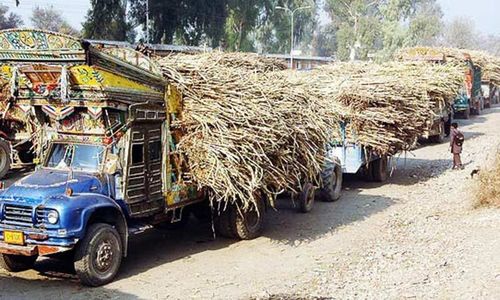ISLAMABAD: The Supreme Court on Wednesday unsealed three rival sugar mills in south Punjab when the five existing and operational mills failed to reach an agreement on finding a via media for lifting the available sugarcane crop from the farmers at the government price of Rs180 per maund.
“Primarily the best interest of the farmers is a predominant factor,” Chief Justice Mian Saqib Nisar observed while ordering to unfreeze the three mills while hearing a plea raised by the Pakistan Kissan Ittehad before a three-judge bench.
The sugar mills which will commence operation instantly are Haseeb Waqas Sugar Mills Ltd, Chaudhry Sugar Mills Ltd and Ittefaq Sugar Mills.
At the last hearing on Feb 19, the apex court had ordered the owners of JDW Sugar Mills, Hamza Sugar Mills, Rahim Yar Khan Sugar Mills, Indus Sugar Mills and Ashraf Sugar Mills, Cane Commissioner Sanaullah and District Commissioner Rahim Yar Khan Suqrat Aman Rana to sit with the growers and come out with a workable solution to end the prevalent crisis and unrest among the farmers.
A meeting was held at the office of senior counsel Barrister Aitzaz Ahsan, the legal counsel representing JDW Sugar Mills of Pakistan Tehreek-i-Insaf leader Jahangir Khan Tareen.
Earlier, these sugar mills had given an undertaking to the Supreme Court to lift sugarcane at Rs180 per maund.
Aitzaz Ahsan explained before the court that the sugar mills had held out the assurance to the farmers during the meeting that they would lift the entire crop within the crushing season.
The chief justice made it clear that the court would not pass any order on the directions of Jahangir Tareen.
Advocate Syed Javed Anwar Shah, representing the Pakistan Kissan Ittehad, argued before the court that the farmers were so dejected that they intended not to grow sugarcane in future. He urged the court to allow the rest of the three sugar mills to function and allow them to buy the sugarcane at the rate of Rs160 per maund.
In response, the chief justice ordered unsealing of the mills with a direction that they would maintain specific record of all the transactions and the court would take up the matter every month and whenever it felt appropriate would seal the mills again.
The court also relieved the other five mill-owners from the earlier commitment to lift the sugarcane at Rs180 per maund.
The court said that when confronted what would be the loss if the mills were unsealed, no cogent reasons were advanced except citing the Lahore High Court judgement which had sealed the three mills.
In its order of Sept 11, 2017, the high court had ordered the three mills to dismantle and relocate their establishment from Bahawalpur and postponed further proceedings till April when the sugar crushing season would have ended. That judgement had been suspended by the Supreme Court on Jan 11, 2018.
Published in Dawn, February 22nd, 2018












































